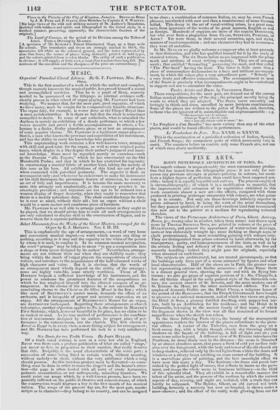Six Duets for two Treble Voices. B,y Joust Hus,t,An.
Of a truth vocal writing is DOW at a very low ebb in England. Never was there such a profuse publication of what are called "songs," yet never so few, in proportion to their number, that really deserve that title. Insipidity is the usual characteristic of the voice part ; a succession of notes being fitted to certain words, without meaning, without melody— in short, without the very attributes which a song
should possess. As this tasteless product must be flavoured—as some- thing must be done in order to rouse the singer's and the hearer's atten- tion—the page is often loaded with all sorts of crude harmonies, pedantic eccentricities, or not unfrequently, schoolboy blunders. We could point out songs which, by a well-known process, have been re- peatedly inflicted on the public in theatres and concert-rooms, of which the construction would disgrace a boy in the first month of his musical tuition. The songs of the present day are, for the most part, nonde- scripts as to character—they belong to no country, and can lie assigned to no class ; a combination of common Italian, or, may be, even French phrases, interlarded with now and then a reminiscence of some German ballad. This decay in the art of vocal-writing arises, in a great meas sure, from ignorance of the works of its great masters, English EIS well as foreign. Hundreds of copyists are there of the copyist DONIZETTI, but who ever finds a plagiarism from CLARI, SrErrAszt, Puma-sus or ARNE? Yet were those, in their several countries, ages, and styles, masters of vocal composition ; and one character they had in common they were all melodists.
In Mr. Husrssu we gladly welcome a composer who at least pretends to that distinction, and who has qualified himself for it by the study of classical writers. The six Duets before as are impressed with the prime mark and attribute of vocal writing—melody. They- are of unequal merit ; that entitled' Serenading" possessing the most, and that called " The Pier-head" having the least. 'File latter is little more than a piece of commonplace declamation to a busy and brilliant accompani- silent, in which the voices play a very subordinate part. " Nobody" is a very lively and effective composition. The accompaniment to most of the Duets is precisely what accompaniments ought to be—calculated to support and not to encumber the voice.


























 Previous page
Previous page